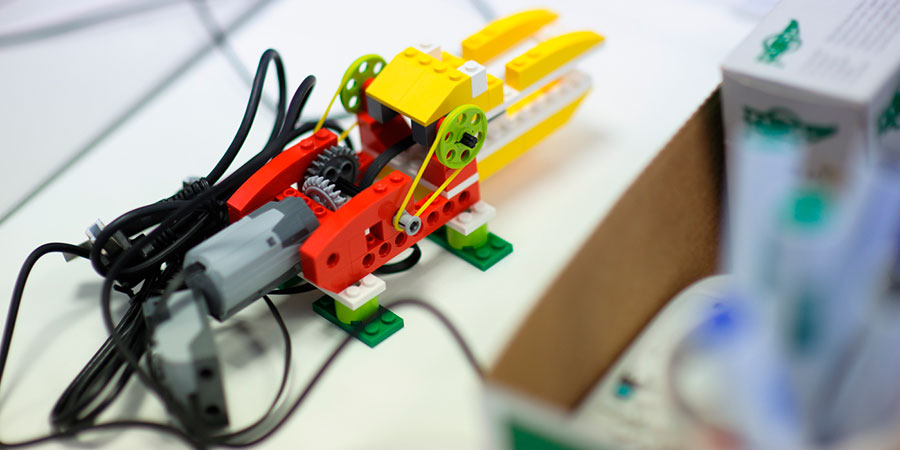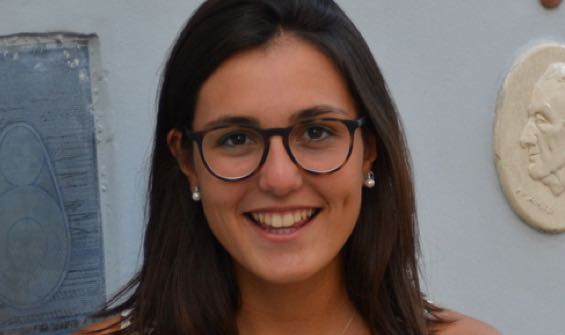Double Bachelor's Degree in Pre-School Education + Primary Education
We have the faculty to train good teachers
At UIC Barcelona you can also expect to receive supplementary education

More career opportunities
This double degree opens the doors to greater employability. It allows you to teach children up to the age of 12.

Further study in STEM education
We also strongly advocate STEM education (Science, Technology, Engineering and Mathematics) in schools and promote t through our robotics workshops, the Experimental Science laboratories and the Domo greenhouse (university allotments).

Practice agreements with foreign schools
Make the most of the agreements with institutions in Finland, Germany, United States, France and Argentina, among other countries.
Prepare for more career opportunities
The Degree in Pre-Primary Education allows you to officially work as a teacher. You can develop activities both in centres that depend on the Public Administration and at private and state-subsidised private centres. You will also have access to other work settings:
- Editorials
- Resource centres
- Leisure activities
- Museum education departments
- Non-formal education centres
Students tell you their experience

“From the first day, what surprised me the most was the friendliness and care of lecturers and other staff; it is nice to always be met by a smile when you get to University. Academically, what I like the most is how the curriculum is organised, because during your first year you build the psychological, pedagogical and didactic foundations that you apply during the whole degree.”
Carla Vidal
Primary Education Degree student

"As well as excellent academic education and the selection of internships, UIC Barcelona boasts lecturers who are pedagogically involved, that create a family environment that helps you to grow both personally and professionally."
Patricia Gassó de Broto
Pre-Primary Education Bilingual Degree student

Professors and lecturers who make good teachers
The teaching team in the Faculty of Education consists of professionals who train future teachers using the most innovative methodologies. They are also involved in important research activities both inside and outside the university. Direct contact with professional practice allows our professors and lecturers to transmit a comprehensive, multidisciplinary and human overview of the reality in the sector to students.
Study abroad

CoWith this degree, you can study part of the curriculum or do your internship abroad, with academic recognition. Participate during one semester or year at one of your faculty's partner universities, or search for a business abroad for your internship. You can also get part of your ECTS during the summer at the Berkeley Summer Sessions, the best public university in the world.

Practice the theory you have learnt
Presentation
The double degree in Pre-Primary and Primary Education at UIC Barcelona allows you to gain a highly attractive professional profile in 5 years while taking on a manageable extra workload. It also means the door is open throughout your professional life for you to choose whether you want to be a teacher for children aged 0 to 5 or 6 to 12.
At UIC Barcelona there is individual attention and an interest in students that will encourage you to overcome the most difficult challenges.
Objectives
We teach you based on objectives. The Bachelor's Degree will provide:
- A sound command of all applicable course content. Always from a global perspective.
- Techniques to ensure peaceful co-existence in the classroom through emotional education and autonomy. Promotion of effort, constancy and discipline.
- Knowledge of how language develops in a multicultural and multilingual environment.
- Out-of-classroom skills relating to school organisation, tutoring sessions for parents or your relationship with other education agents. Preparation for the demands of today's society.
- Sensitivity to diversity and gender equality. Respect for human rights and civic values.
- The ability to introduce students to the digital world and add cultural richness through new pedagogical possibilities.
- Valuing cooperative work, a critical spirit and responsibility in relation to a sustainable future.
Competences of graduates
Your competences are what set you apart as a teacher who is useful to society.
Cross-disciplinary competences
Mastery of information technology and communication, languages (Catalan, Spanish, English), developed critical thinking and reflective analysis, the ability to be creative.
Teacher-specific competences
Expertise in the subjects you teach and the teaching methods you employ, ability to work with colleagues and other staff members, professional development.
Subject-specific competences
Competences you will develop through a number of diverse methods such as lectures, case studies, problem solving and problem-based, project-oriented, cooperative and independent learning.
At UIC Barcelona we will assess your competences through: objective exams, assignments and projects, portfolios, reports, self-evaluation, interviews, etc.
Academic accreditation
Graduado o Graduada en Educación Infantil por la Universitat Internacional de Catalunya.
Graduado o Graduada en Educación Primaria por la Universitat Internacional de Catalunya.
Teachers
- AGUIRRE ARTEAGA, Georgina
- ALBAREDA TIANA, Sílvia
- AMORES BARGAY, Joan
- ARÉVALO SAINZ, Raquel
- BALAGUER FÀBREGAS, Maria Carmen
- BALCELLS SANAHUJA, Meritxell
- BOSCH RABELL, Magdalena
- CAMPS BANSELL, Jaime
- CARBALLO MARQUEZ, Anna
- CARRERAS PARERA, Joaquim
- CARR MILIO, Tomas Joaquin
- CORRES GALLARDO, Andrea del Carmen
- CREUS JORQUERA, Ingrid
- DE BOFARULL DE TORRENTS, Ignacio
- DOMINGO COSCOLLOLA, Maria
- ESTRADA BASCUÑANA, Carolina
- EVNITSKAYA, Natalia
- FERNÁNDEZ MORILLA, Mónica
- FUERTES CAMACHO, Maria Teresa
- GONZÁLEZ MANCEBO, Sheila
- GOTSENS BELLART, Mª Teresa
- GRAELL MARTIN, Mariona
- GRAU GRAU, Marc
- GUTIÉRREZ SIERRA, Andreu
- HOWES, Christina Angela
- INSENSER MORENO, Maria
- JIMÉNEZ LÓPEZ, Esther
- LÓPEZ CARNEROS, Maria José
- LUNA BROSA, Maria Cristina
- MARTORELL SABATÉ, Eduard
- MASVIDAL ROQUET-JALMAR, Nuria Maria
- MEHRAD, Aida
- MONFORTE, Pierre Jérome
- NAVARRO GIL, Noelia
- OLIVA MARTÍNEZ, Francisco-Javier
- PERETA SIMÓN, Elena
- PÉREZ DEL VALLE, José
- PÉREZ NICOLAU, Meritxell
- PONS MUDARRA, Cristina
- PORTELL RIFÀ, Joan
- PUIG VOLTAS, Jordi
- PUJOL VALLS, Maria
- REY PEÑA, Beatriz Paloma
- RODRÍGUEZ PRAT, Andrea Mercedes
- ROIG MARZÁ, Alberto
- ROMERO VELASCO, Margarita
- ROQUET PUGÈS, Helena
- SÁNCHEZ CAMACHO, Rafael
- SCOTT, Yolanda Isabel
- SERRA ORDOÑEZ, Montserrat
- VASYLETS, Olena
- VERDERA ALBIÑANA, Asunción
- VIDAL RODÀ, Enric
- AGUIRRE ARTEAGA, Georgina
- AGUSTIN BRETOS, Susana
- ALBAREDA TIANA, Sílvia
- AMORES BARGAY, Joan
- BALAGUER FÀBREGAS, Maria Carmen
- BALCELLS SANAHUJA, Meritxell
- BONET PEROT, Ariadna
- BOSCH RABELL, Magdalena
- CABALLERO RIVAS, Cristina
- CAMPAMÀ TUBAU, Joan
- CAMPS BANSELL, Jaime
- CARBALLO MARQUEZ, Anna
- CARR MILIO, Tomas Joaquin
- CIBORRO ROJO, Núria
- CORRES GALLARDO, Andrea del Carmen
- CREUS JORQUERA, Ingrid
- DE BOFARULL DE TORRENTS, Ignacio
- DÍAZ HEVIA, Pablo
- DOMINGO COSCOLLOLA, Maria
- DOMÍNGUEZ BERNÚS, Alejandro
- ESTRADA BASCUÑANA, Carolina
- FERNÁNDEZ ELORDUY, Ainhoa
- FUERTES CAMACHO, Maria Teresa
- GONZÁLEZ MANCEBO, Sheila
- GRAELL MARTIN, Mariona
- GRAU GRAU, Marc
- GUTIÉRREZ SIERRA, Andreu
- HOWES, Christina Angela
- INSENSER MORENO, Maria
- JIMÉNEZ LÓPEZ, Esther
- LUNA BROSA, Maria Cristina
- MARTÍN GASCON, Beatriz
- MARTORELL SABATÉ, Eduard
- MASVIDAL ROQUET-JALMAR, Nuria Maria
- MEHRAD, Aida
- MONFORTE, Pierre Jérome
- NAVARRO GIL, Noelia
- OLIVA MARTÍNEZ, Francisco-Javier
- PASCUAL SÁNCHEZ, Joel
- PERETA SIMÓN, Elena
- PÉREZ DEL VALLE, José
- PONS MUDARRA, Cristina
- PORTELL RIFÀ, Joan
- PUIG VOLTAS, Jordi
- PUJOL VALLS, Maria
- RODRÍGUEZ PRAT, Andrea Mercedes
- ROIG MARZÁ, Alberto
- ROMERO VELASCO, Margarita
- ROQUET PUGÈS, Helena
- SÁNCHEZ CAMACHO, Rafael
- SCOTT, Yolanda Isabel
- SEGURA RODRÍGUEZ, Cristina
- SERRA ORDOÑEZ, Montserrat
- TUSET MATEU, Mª Teresa
- VASYLETS, Olena
- VERDERA ALBIÑANA, Asunción
- VIDAL FLURIACH, Carla
- VIDAL RODÀ, Enric
Internship
Practicums
When it comes time to complete your teaching practicums, we have partnerships with public, charter and private institutions. In the case of public and charter institutions, the schools must be accredited by the Government of Catalonia's Department of Education. As for private institutions, we establish bilateral cooperation agreements with universities and institutions in and outside Catalonia and abroad.
Objectives
The practicums will help you strengthen the competences you have acquired and put theory into practice. Your skills will enable you to observe and carry out a descriptive and interpretive analysis of each context and intervene, first under guidance and then independently, in children's learning.
How it works
The teaching practicums are educational in nature and are part of the mandatory Practicum module.
Practicums are divided into the following subjects:
- School Practicums I
- School Practicums II
- School Practicums III
Regulations
The teaching practicums are governed by both legal and internal regulations. Under the legal regulations, an agreement must be signed prior to beginning the practicums. In this agreement we will set out the arrangements and commitments established between the institutions, UIC Barcelona and you. Insurance is included in your enrolment fee.
The internal regulations lay down the guidelines for each teaching practicum and define the tasks of all those involved: the tutors at the schools, UIC Barcelona and you. These regulations are included in the course guide of each subject.
Professional opportunities
The Bachelor's Degree in Pre-Primary Education will enable you to work as a qualified teacher.
You will be able to teach in government-funded schools, as well as both charter and private schools.
You may also gain employment in other areas:
- Publishing companies
- Resource centres
- Leisure activities
- Education departments at museums or non-formal education centres
Prerequisites & admissions
PAP Test
From the 2024-2025 academic year onwards, the Personal Aptitude Tests (PAP), organised and externally evaluated by the Interuniversity Council of Catalonia (CIC), will have to be passed before admission to the bachelor’s degree, or during the first year of the studies.
The Faculty of Education Sciences offers a PAP online preparatory course.
Application for admission
To register for Degree in Pre-Primary Education at UIC Barcelona, click on the following link and complete the application form:
Entrance exams
After submitting your application you are required to take an entrance exam on our Barcelona Campus. You may take it on any of the following dates:
Required documentation
We believe there are many ways to start your new life at university. Each requires certain documentation:
Entrance exam results
The entrance exam results will be available one week after you take the exam:
Reservation and enrolment
After you receive the acceptance letter, you must pay 20% of the full cost of the first year to reserve a place. You will pay the remaining 80% in one lump sum once enrolment is complete.
More information:
Grants & financial aid
Grants
UIC Barcelona offers various fellowships supported by both public institutes (MEC or AGUAR) as well as private UIC Barcelona funds.
For further information, please check with our admissions department:
Financial aid
Each payment method is adhered to the specific financing conditions of each degree programme.
Please see the attached document for details on these conditions:
Discounts
Those seeking undergraduate degrees at UIC Barcelona may be eligible for different discounts depending on their circumstances.
Aptitude
What is it?
The personal aptitude test (PAP) is a test to access Early Childhood and Primary Education degree programmes in all universities, public and private, in the Catalan university system. It consists of two exams that evaluate communicative and critical reasoning competence and logical-mathematical competence.
Why is taking the personal aptitude test recommended?
Vocation is essential because as a future teacher you will become an example to follow of attitudes and values, you will train and educate people who will be the society of the future. However, it is also essential to demonstrate that you have the necessary skills to become a teacher. While PAP is not a requirement to access our Education degree programmes, we encourage all our students to take the test before beginning their studies or at some point during the degree programme.
How is the personal aptitude test scored?
The final qualification of the personal aptitude test is pass/fail.
The test is considered passed (pass) when the final mark is equal to or greater than five points out of ten. This final score is obtained from the average of the exams of the two competencies evaluated. Once passed, the personal aptitude test will be valid indefinitely.
When is the personal aptitude test offered?
There are two calls:
- Saturday, 15 April, (ordinary call)
- Friday, 19 July (extraordinary call)
You can check the time periods and procedures for registration here.
Personal aptitude test results are published on the university access portal.
Who has to take the personal aptitude test?
- Upper secondary students
- Higher vocational education and training (CFGS)
- Students from foreign educational systems
- Students who access the Education degree programmes by record transfer.
- Students who enter the university through specific tests for people over age 25, 40 or 45.
- Students who, having taken the University Entrance Exam (PAU) or the entrance exams for people over 25 and over 45 years before 2017, do not meet the personal aptitude test conditions defined for 2014, 2015 and 2016 pre-registration.
Who does not have to take the personal aptitude test?
- Students who have passed the PAP in a previous call.
- Students from years prior to 2017 who meet the PAP conditions defined for the 2014, 2015 and 2016 university pre-registration.*
- University graduates or equivalent.
If I fail the personal aptitude test in April, can I take the test in the July call?
You can take the test as many times as you want. However, you should keep in mind that, if you pass in the extraordinary call of July, you will have lost your reserved place for the studies selected in the June pre-registration period. However, if you have taken the admission tests to study at the UIC Barcelona Faculty of Education, you have passed them and you have formalised the reservation, we will hold it until you know the PAP results from the July call.
How can I prepare for the personal aptitude test?
Students must prepare yourselves on your own from the test models available on the web or by checking here on how we can help you from the UIC Barcelona Faculty of Education.
Education degree programme entrance exam preparation course
Virtual course aimed at reinforcing logical-mathematical and communicative competences. The content and exercises will be like those you will encounter on the personal aptitude test (PAP). Classes will take place in the Faculty of Education.
Price: €180 (this amount will be deducted from tuition cost)
Virtual classes
Virtual class schedule:
- Tuesdays, 6.00 to 9.00 p.m. - Logical-mathematical competences.
- Thursdays, 6.00 to 9.00 p.m. - Communicative competences.
Dates:
- First call: 1 to 31 March 2023.
- Second call: 14 June to 14 July 2023
Faqs
FAQs
General information
How many places are available at the Faculty of Education?
There are 80 places available across our degree programmes in Education and 90 places on our bachelor’s degrees in primary Education. The places are divided into smaller groups depending on the subject. The new double degrees in Pre-Primary Education with Psychology and in Primary Education with Psychology, offer a total of 10 places.
How much does a bachelor’s degree in education cost?
The price depends on the degree programme. You can check the cost of credits at uic.es/educación
Do students need to buy books or any other additional materials for classes?
No, all teaching material is available on the University’s digital platform and at the Library. There are no elevated costs associated with the material.
What kind of grants or funding can I get to study education at UIC Barcelona?
You can check our website for all options regarding grants, discounts or free enrol- ment, as well as funding conditions. If you have an average mark of 8 from your first year of upper secondary school, or a 9 from your first year of CFGS, you can apply for an Academic Excellence Grant. (uic.es/becas).
When will exams be held?
From 3 to 5.30 p.m. approximately.
How and where are the exams held?
To ensure candidates’ safety, we have decided to hold all entrance exams online. Before the exam, we will send you all the information you need to access it (how to log in, your username, password, timetables, etc.)
When do the work placements begin?
Students start classroom work placements from their first year. External work placements in education begin in the second year, three weeks in alternation. During the third year they last six weeks, and in the fourth year, three months.
Access routes
Can I apply for the entrance examinations with any upper secondary school qualification?
Yes, you can apply from any type of upper secondary school qualification.
Can I apply to sit the entrance examinations from any higher level vocational training course (CFGS)?
Yes. And in addition, depending on the CFGS, students can have up to 30 ECTS credits officially recognised.
If I have already completed a bachelor’s degree, do I have to take the entrance exams?
Yes, everyone has to take the entrance exams.
Can any of my subjects be officially recognised if I have already started university studies?
Yes, you can request that your subjects be officially recognised, especially if your previous degree programme was in the same field of knowledge: Social Sciences.
Entrance exams and the admission process
What is the cut-off mark for accessing a degree programme in education?
Your admission will depend on the outcome of our University’s entrance exams, in addition to passing the PAU (national Spanish university entrance examinations) and the PAPs (personal aptitude test).
What do the entrance exams involve?
They involve: a psycho-technical test, an English test, a specific Spanish and Catalan language test, a general culture test and a one-to-one interview. All of these tests are sat the same day.
Can I look up past entrance exam papers?
We do not provide past papers from previous years’ exams. In the case of the specific tests, we suggest that you revise one or more first-year upper secondary school text books. And for the psycho-technical test, you can find examples on the internet that give you an idea of the style of the exam.
Is the examination multiple choice?
Yes. Any incorrect answers will not be deducted from your total score. Only those candidates applying for an Academic Excellence Grant will sit another written exam.
What level of English is required for the exam?
You do not need to have a minimum level of English to access the bachelor’s degrees in education, we only request a minimum B2 level in the case of bilingual subjects on bachelor’s degrees and double degrees.
How are the marks from both my academic record and the entrance examinations weighted?
5% is attributed to your academic transcript, 25% to the entrance exams and 10%, to the one-to-one interview.
Can I choose the date of the entrance exam?
You can request a specific date, but you must wait for a notification from the
Admissions Department who, after reviewing your documentation will confirm the date of your test via email. The number of places will decrease as the exam sittings take place. In general, we recommend attending the first calls. You can see the entrance exams dates by visiting: uic.es/ca/admissions/graus/ proves-admissio
When will I find out the results of the entrance exams?
The results will be sent via email approximately 15 working days after the exams have been taken.
If I am ‘not admitted’ can I attend the following call during the same academic year?
No, you can only attend one call per academic year.
If I am admitted, what is the next step?
You will receive a letter of admission containing information about the next steps to take in order to reserve your place which means paying 20% of the fee for the first year. You will pay the remaining 80% during the enrolment period, between July and September.
If I choose not to study at UIC Barcelona after having reserved a place, will the reservation fee be refunded to me?
The reservation fee will only be refunded if you do not pass upper secondary school or pass the PAPs. This clause is laid out in our General Terms and Conditions.
Do I have to pass the PAPs to be able to access a bachelor’s degree in education at UIC Barcelona?
The PAP tests are not an admission requirement for non-profit private universities, but they are part of an agreement to improve the profile of future teachers. If you have not passed the test before beginning your studies at the Faculty, you must do so during your first year.
International mobility
Study abroad temporarly
As a student in this degree programme, you may complete part of your degree or a work experience placement abroad and receive academic recognition.
Spend a semester or a full academic year at one of your Faculty’s partner universities or find a company abroad to do an internship. You may also:
- Earn ECTS during the summer at the Berkeley Summer Sessions, the world’s best public university.
For information about everything you need to do before, during and after your mobility stay, check out the "Study abroad" section and download all the documentation specific to your Faculty:
If you are student of one of the double degrees you can also access the mobility opportunities of these faculties.
Study with us temporarily
If you are a student at another university in Spain, or in another country, you can come to do a mobility stay at UIC Barcelona during a semester or academic year.
Visit the international exchange students site for more information and, download here all the specific documentation of this faculty:
